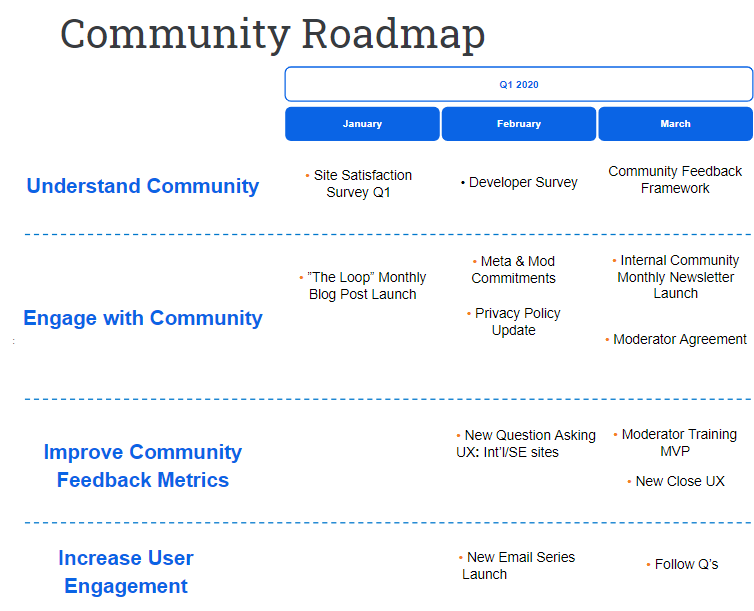This is a really encouraging blog post, and I appreciate the roadmap being shared with us. We need to talk about part of it though.
We are making fundamental changes to how our close question system works so that it’s a friendlier experience and more educational for post authors, while making it easier to edit and reopen closed questions, and reduce the burden on curators. Questions that get voted to be closed will be hidden, giving authors the opportunity to improve their questions in private. Our hope is to make it easier on everyone by providing clearer guidance and encouraging better questions. [...]
Could you clarify what this means implementation-wise?
It sounds like it means a closed question will be hidden from everyone except the author (or maybe high-rep users). This would be very, very bad for everyone involved, even the author of the question!
Here's how the close-edit-reopen process works on many large sites:
- Close: The question is closed ASAP, because serious work needs to be done on the question and we need to put answers on hold for now. (Otherwise as the question changes, answers will get invalidated and we'll have a huge mess to clean up, including people upset their answers are now not answering the question—because they were fine originally.)
- Edit: Community members actively engage with the closed question and its author, asking questions, making edits, and providing direction that bring the question into a reopenable form.
- If the question is not going to be reopenable (e.g. it's just a poll for peoples' opinions on their favorite soda) then that gets conveyed during this engagement. The querent may be directed to other places they can ask about this instead.
- Reopen: People come across the question as revisions bump it, and reopen it once it's reopen-worthy. Alternately, maybe the question never should have been closed at all: people who discover it reopen it right away. Invested community members may open meta Qs requesting assistance reopening the question at any stage.
Hiding a closed question impedes or makes impossible all three steps of this process. As one of my fellow mods put it: newbies already believe closing to be a death sentence for their question. This would mean it actually is a death sentence.
Let's walk backwards through this and talk about the problem hiding a closed question represents at each step.
3. Reopen
This relies on users discovering a question as revisions bump it, evaluating it, and casting reopen votes. The meta Qs that might arise around the question's closure rely on invested community members discovering the question while it's still closed.
Who's going to do any of this if nobody can discover the question?
2. Edit
Getting a question into a reopenable shape always involves engagement from the broader community. Authors do not usually independently know what to do with their question to get it into an open-worthy state without feedback, or they would have asked it that way to begin with! Continuous engagement with the broader community is critical here.
That helpful engagement that gets questions revised can come from the entire reputation spectrum, both in theory and in practice. (Provided you have the 50-rep comment anywhere privilege, usually.) Even users who are too new to contribute can learn a lot from seeing our process in action, including learning that if/when their question is closed they can expect similar assistance.
1. Close early
Closing questions fast and early is an extremely important quality management tool. We need to hit the brakes to give the question room to be worked on without also dealing with answers arriving.
But people want to help. They really, really want to help. It's the whole reason they're here on the site. If a question is hidden when it's closed, that means they will not be able to help while it's closed. That means people will not want to vote to close a question if it's in a possibly-recoverable state, because then they're blocking the community from helping it.
This means people will not use the close tool early and often, or at all if they can help it, leading to really bad quality issues and headaches. Many of the people who currently vote to close fast and early will instead begin to abstain from close voting—and for the exact same motivation!
In summary
... So, with all that said, I hope you can understand why I hope “questions that are closed get hidden” does not actually mean what it sounds like. But I don't know what else it would be.
Could we talk about that thing? Can you tell us more about it? If it's what it sounds like, can we not do this thing?

